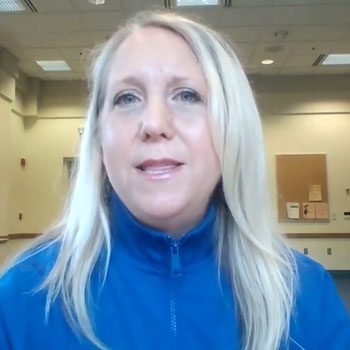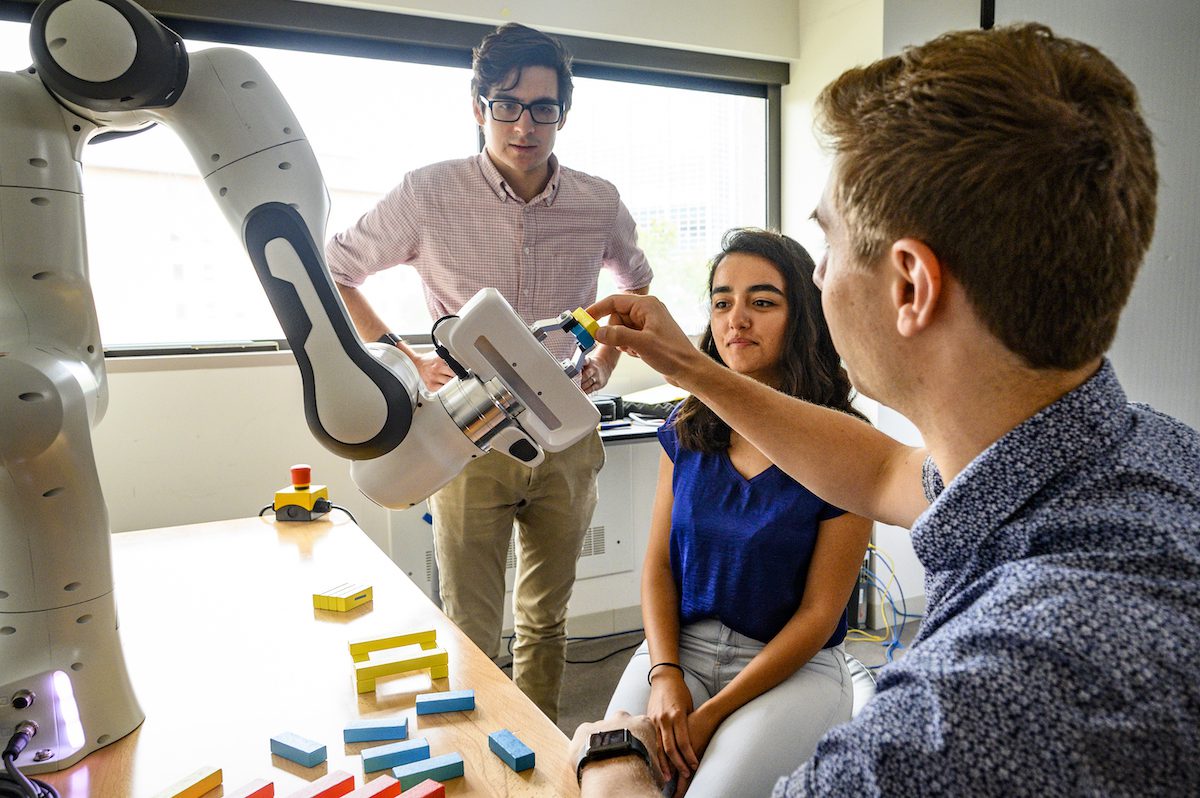Library & Information Studies: Online Option
Master of Arts in Library & Information Studies

Work with people, information, and technology to solve problems and promote the public good. The iSchool’s online master’s program in Library & Information Studies prepares you for a career in library, nonprofit, or business settings.
Is this program right for you?
The UW–Madison Online Master’s Degree in Library and Information Studies offered by the Information School (iSchool), combines a top research university academic experience with strong community, excellence in career and academic advising, and personal attention.
You will learn to use, develop, and manage cutting-edge technologies to promote information access and use, and data management. The 36-credit program begins with a virtual orientation bootcamp that will prepare you to be an effective online learner and includes a thoughtful blend of live group sessions and solo activities. You will leave orientation ready to be successful in online courses, and already connected to fellow students, faculty, and staff in your new learning community.
Our Online Master’s Degree balances flexibility for students with a high-quality academic program and dedicated career services and advising staff. A required 120-hour field-experience practicum, near your home, prepares you to apply what you learn in a real-world setting, while polishing your career skills and gaining real-world experience.
Is this program right for you?
The UW–Madison Online Master’s Degree in Library and Information Studies offered by the Information School (iSchool), combines a top research university academic experience with strong community, excellence in career and academic advising, and personal attention.
You will learn to use, develop, and manage cutting-edge technologies to promote information access and use, and data management. The 36-credit program begins with a virtual orientation bootcamp that will prepare you to be an effective online learner and includes a thoughtful blend of live group sessions and solo activities. You will leave orientation ready to be successful in online courses, and already connected to fellow students, faculty, and staff in your new learning community.
Our Online Master’s Degree balances flexibility for students with a high-quality academic program and dedicated career services and advising staff. A required 120-hour field-experience practicum, near your home, prepares you to apply what you learn in a real-world setting, while polishing your career skills and gaining real-world experience.
Admissions requirements
All applicants must:
- Have a bachelor’s degree from a regionally accredited U.S. institution or a comparable degree from an international institution. An undergraduate program that includes breadth in liberal arts and sciences is required.
- Have an undergraduate degree in any major. Undergraduate coursework in library and information studies should not be so extensive as to dilute the liberal arts component of the bachelor’s degree.
- Have a minimum undergraduate grade point average (GPA) of 3.0 on a 4.0 scale or the equivalent based on the last 60 semester credit hours OR a master’s degree with a minimum cumulative GPA of 3.0
- The GRE is not required, nor are submitted scores considered.
- Provide an English proficiency test score if your native language is not English or your undergraduate instruction was not in English. The required proficiency scores are: TOEFL IBT 92, PBT 580; or IELTS 7.0.
Application materials required:
- Online application
- Resume
- Statement of purpose or reason for graduate study
- Contact information for three references
Connect with us
Application Assistance: Design + Innovation MS
September 17
noon-12:30 p.m.
Join program staff to learn strategies to make your Master of Science in Design + Innovation application stand out with. You’ll leave knowing what you need, and how to successfully apply.
Register for Application Assistance: Design + Innovation MS
Program Overview & Career Outlook: Library & Information Studies MA
October 15
5-5:30 p.m.
Join program staff to get more information about the MA in Library & Information Studies Online and On-Campus programs including program requirements, concentration options, and application requirements.
Register for Program Overview & Career Outlook: Library & Information Studies MA
Program highlights
- Our program is entirely online, with a four-day in-person orientation that allows you to meet UW faculty and learn keys to succeeding in the online master’s program.
- Our program has been accredited by the American Library Association since 1924. You’re enrolling in a program with a long legacy of preparing innovative and informed professionals.
- Complete a culminating 120-hour field experience practicum near your home to apply what you’ve learned in a real-world setting.
How you'll learn
- Online curriculum, with a required 120-hour field experience practicum near your home.
- Complete a four-day residential “boot camp” to begin the program.
- Online courses are primarily asynchronous, with some synchronous online meetings. Coursework follows the UW–Madison semester schedule, with timed content units, discussion board topics, and due dates for exercises and final projects.
- Participate in online sessions, a field experience practicum, and completion of an e-portfolio.
Sample curriculum
Tier 1: Required Courses
- Information: Perspectives & Contexts
- Information: Organization & Search
- Research and Assessment for Information Professionals
Tier M: Management
- Information Services Management
- Public Library Administration
- Strategic Information Services
All MA students must complete at least one Tier M course for a minimum of 3 credits.
Tier T: Technology
- Code & Power
- Digital Tools, Trends & Debates
- Intro to Information Architecture & Interaction Design for the Web
- Information Experience Design, Testing & Evaluation
- Digital Curation & Collections
- Database Design & Management
- Digital Humanities Analytics
All MA students must complete at least one Tier T course for a minimum of 3 credits.
Practicum
In addition to the courses, students are required to complete a 120-hour practicum. Most students fulfill the practicum requirement by taking LIS 620, Field Placement in Library & Information Agencies.
Electives
All other courses needed to meet the 36-credit minimum for the MA program are considered electives.
E-Portfolio
Completion of the e-portfolio is a graduation requirement for all students. Portfolios will be assessed on a pass/fail basis.
Job outlook
- Reference/Public services librarian
- Youth services librarian
- Library director
- Library administration
- Archives and collection preservation
Source: Lightcast™ 2022.
Salary source: Library Journal’s Placements and Salaries Survey 2021.
Heather Johnson wanted to go back to school for a master’s degree in library studies, but couldn’t do it the traditional way. She found the flexibility she needed in UW–Madison’s iSchool Online Master’s program.
Ready to learn more about Library & Information Studies: Online Option?
View the UW-Madison Guide
Stay in touch
Sign up to receive application tips and deadline reminders.
Connect with our enrollment coaches
Our friendly, knowledgeable enrollment coaches are here to answer your questions. Contact an enrollment coach to:
- Learn how to make this program work with your life/schedule
- Get help with your application
- Determine if financial aid is available
Visit with our coaches on campus or at an upcoming student fair in your area. Search student fairs & events.

Read more about HeatherSometimes when it’s the middle of the night and you’re working on a project, it’s nice that you can send out an email and get a response back from your professor in a timely manner. That lets you know, ‘Hey, you’re maybe miles away, but you’re not alone, I’m here to help you.
Heather Johnson, Student


